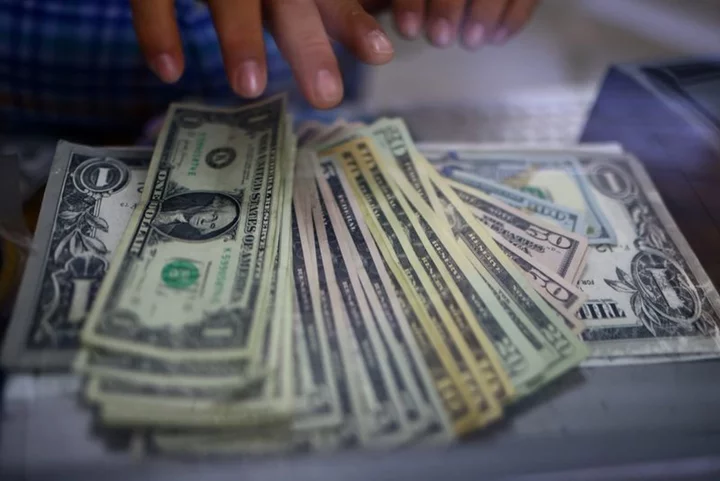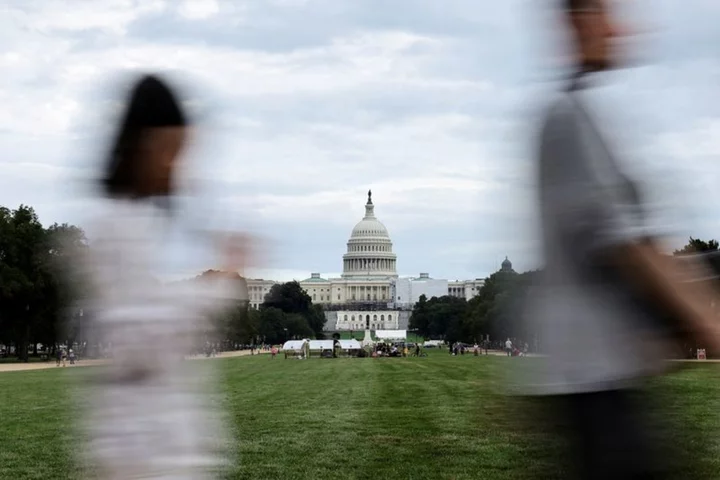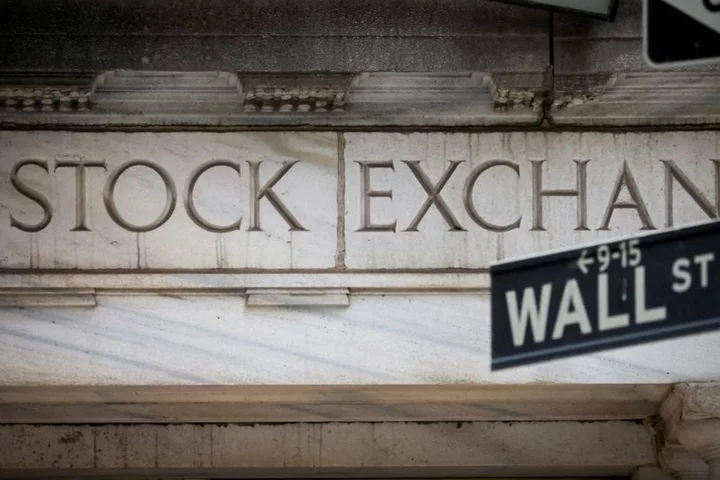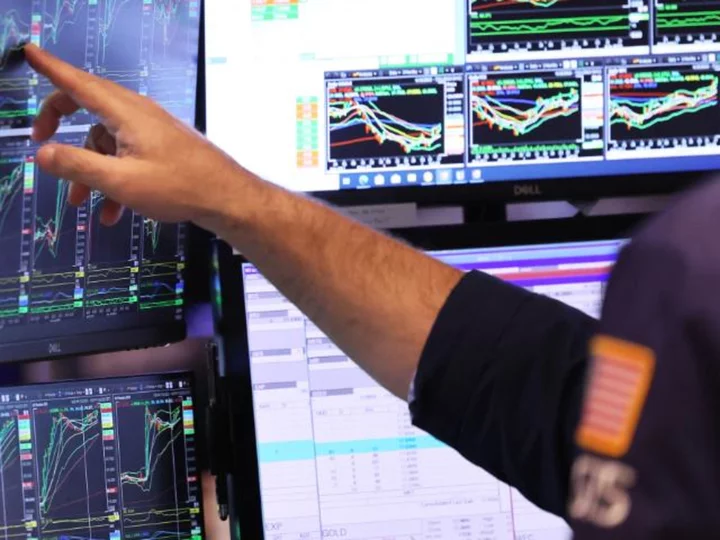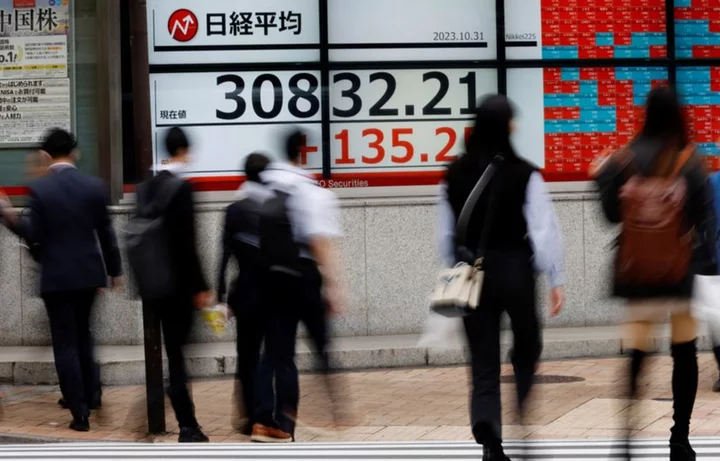A look at the day ahead in U.S. and global markets by Mike Dolan
A renewed surge in long-term Treasury yields is stifling world markets yet again as Federal Reserve officials hang tough on one more rate rise, some $134 billion of new government debt sales hit this week and a government shutdown looms.
The yield spike has supercharged the U.S. dollar worldwide - both a reflection and aggravator of mounting financial stress far and wide.
Despite wariness of Bank of Japan intervention, the dollar/yen exchange rate hit its highest for the year on Tuesday - as did the dollar's DXY index and the dollar's rate against the South Korea's won. Sterling hit a 6-month low.
Treasury tremors continue to reverberate from last week's upgraded Fed forecasts, its insistence on signalling one more rate rise in the current tightening cycle and an uncompromising 'higher-for-longer' mantra.
Short term Fed futures haven't moved much. All the action is in longer-dated U.S. Treasuries, which may now be repricing the economy's resilience over multiple years and more persistent inflation pressures.
Ten-year Treasury yields, which have added a whopping 25 basis points in just a week, hit another 16-year high at 4.5660% early on Tuesday. As Deutsche Bank notes, this is historically significant territory as the average of the 10-year yield going back to 1799 is around 4.50%.
Thirty-year bond yields, meantime, have jumped over 30bp in a week to a 12-year high of 4.6840%.
And as an indication of how the long-term sustainable interest rate structure as whole is being re-thought, the 10-year real, inflation-adjusted yield has also leaped 26bp to 2.20% - its highest since 2009.
Significantly, this is shifting the deeply-inverted 2-to-10 year yield gap - which has for more than a year indicated recession ahead but which now looks to be closing that negative spread to its smallest since May.
The latest wobble - which has seen exchange-traded funds in U.S. Treasuries deepen year-to-date losses to more than 6% and losses over three years to more than 20% - comes as another heavy supply of new paper goes up for auction this week.
The Treasury sells $48 billion in two-year notes on Tuesday, $49 billion in five-year paper on Wednesday and $37 billion in seven-year notes on Thursday.
A government shutdown from this weekend is still looming with no budget deal in Congress yet to avert it and Moody's warning of sovereign credit rating implications.
The Fed seems in no mood to calm the horses.
Minneapolis Fed Bank President Neel Kashkari said on Monday the Fed probably needs to raise borrowing rates further.
"If the economy is fundamentally much stronger than we realized, on the margin, that would tell me rates probably have to go a little bit higher, and then be held higher for longer to cool things off," Said Kashkari.
Even a typically more dovish Chicago Fed boss Austan Goolsbee sounded hawkish. "The risk of inflation staying higher than where we want it is the bigger risk," he said, adding the Fed would now have to "play by ear" in conducting policy.
Private sector bankers are starting to brace for the worst, with JP Morgan chief Jamie Dimon reported overnight as warning: "I am not sure if the world is prepared for 7% (Fed rates)."
Even though the European Central Bank seems shier of even higher rates, the higher-for-longer message there too is clear. ECB chief Christine Lagarde said on Monday the central bank can meet its 2% inflation target if record high rates are maintained for "a sufficiently long duration."
In a thin data diary on Monday, the Dallas Fed's September manufacturing survey showed a deterioration of activity there this month. The Chicago Fed's national business poll for August also fell.
And a retreat in energy prices would have soothed some inflation worries, with U.S. crude falling back to $88 per barrel for the first time in almost two weeks,
Nationwide consumer confidence tops the slate on Tuesday.
Despite a late rally in Wall St stocks on Monday, futures are back about 0.5% in the red - as were bourses in Asia and Europe as the end of the third quarter hoves into view on Friday.
China Evergrande shares slid for a second day, dropping as much as 8% after a unit of the embattled property developer missed an onshore bond repayment.
There was no sign of a breakthrough in the widening U.S. autoworkers labor dispute, seen as inflationary by some due to potential supply outages.
Key developments that should provide more direction to U.S. markets later on Tuesday:
* US Sept consumer confidence, US Aug new home sales, July house prices, Richmond Fed Sept business survey, Dallas Fed Sept service sector survey, Philadelphia Fed Sept services survey
* Federal Reserve Board Governor Michelle Bowman gives pre-recorded remarks to Washington conference
* U.S. Treasury auctions $48 billion of 2-year notes
* U.S. corporate earnings: Costco, Cintas
(Reporting by Mike Dolan; Editing by Christina Fincher)

